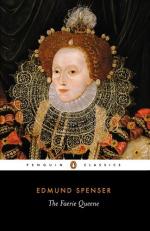Spenser’s residence in Cambridge extended over seven years, during which he received the usual degrees of bachelor and master of arts. He became one of the most learned of English poets, and we may infer that while at this seat of learning he laid the foundations for his wide scholarship in the diligent study of the Greek and Latin classics, the philosophy of Plato and Aristotle, the pastoral poetry of Theocritus and Vergil, and the great mediaeval epics of Italian literature. On account of some misunderstanding with the master and tutors of his college, Spenser failed to receive the appointment to a fellowship, and left the University in 1576, at the age of twenty-four. His failure to attain the highest scholastic recognition was due, it is supposed, to his being involved in some of the dangerous controversies which were ripe in Cambridge at that time “with daily spawning of new opinions and heresies in divinity, in philosophy, in humanity, and in manners.”
On leaving the University, Spenser resided for about a year with relatives in Lancashire, where he found employment. During this time he had an unrequited love affair with an unknown beauty whom he celebrated in the Shepheards Calender under the name of Rosalind, “the widow’s daughter of the glen.” A rival, Menalchas, was more successful in finding favor with his fair neighbor. Although he had before this turned his attention to poetry by translating the sonnets of Petrarch and Du Bellay (published in 1569), it was while here in the North country that he first showed his high poetic gifts in original composition.
After a visit to Sir Philip Sidney at Penshurst, Spenser went down to London with his friend in 1578, and was presented to Sidney’s great uncle, the Earl of Leicester. He thus at once had an opportunity for advancement through the influence of powerful patrons, a necessity with poor young authors in that age. An immediate result of his acquaintance with Sidney, with whom he was now on relations of intimate friendship, was an introduction into the best society of the metropolis. This period of association with many of the most distinguished and cultivated men in England, together with the succession of brilliant pageants, masks, and processions, which he witnessed at court and at Lord Leicester’s mansion, must have done much to refine his tastes and broaden his outlook on the world.
In personal appearance Spenser was a fine type of a sixteenth century gentleman. The grace and dignity of his bearing was enhanced by a face of tender and thoughtful expression in which warmth of feeling was subdued by the informing spirit of refinement, truthfulness, simplicity, and nobility. He possessed a fine dome-like forehead, curling hair, brown eyes, full sensuous lips, and a nose that was straight and strongly moulded. His long spare face was adorned with a full mustache and a closely cropped Van Dyke beard.




